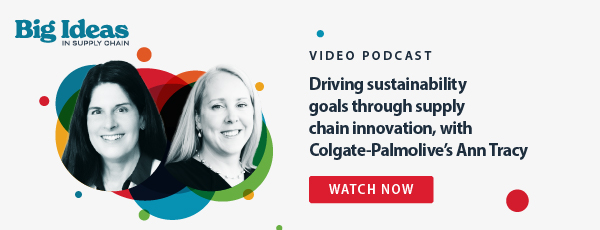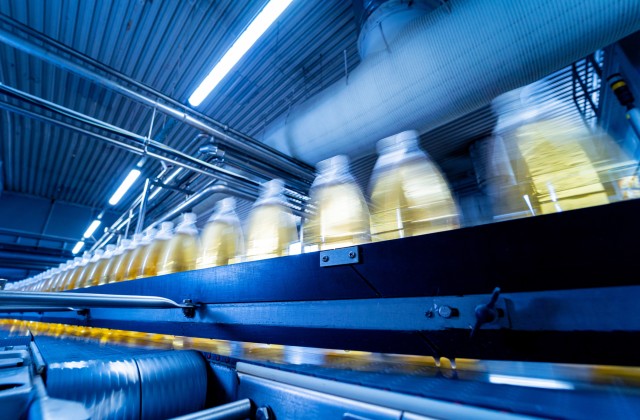Though widely known for helping people have brighter smiles with its toothpaste products, Colgate-Palmolive are global leaders in oral, personal, pet, and home care. They’re also leaders in forging a brighter future in supply chain sustainability, a critical topic among stakeholders and consumers alike.
Amidst forthcoming regulations and goals around sustainability in ESG, Colgate-Palmolive has managed to stay on top by starting a sustainability program rooted in the supply chain, and importantly, making decisions with innovation at the forefront.
As the Chief Sustainability Officer at Colgate-Palmolive, Ann Tracy leads the company’s focus on climate change, designing sustainable products, fighting for social justice and more. In this episode of Big Ideas in Supply Chain, Ann is joined by Dr. Anne Robinson, Chief Strategy Officer at Kinaxis to discuss why supply chains are well positioned to address issues related to sustainability, the importance of a circular supply chain, and how to spearhead your company’s sustainability journey.
Tying sustainability with supply chain innovation
If you want to improve sustainability efforts within your organization, it’s imperative that supply chain innovation is in the same conversation. “I don’t see how we can move forward without true innovation across the company,” says Ann. She explains that “Scope One and Two is our own operations, our equipment usage, our emissions, and our energy use. Then Scope Three is what's outside our operations like our suppliers, purchase goods and services, logistics, and even downstream when our consumers take our products home and use them […] We will not be able to tackle it without innovation.”
Colgate-Palmolive has embraced this with new equipment in their factories that are much more efficient and sustainable than what they used in the past. Their new factory in Kansas, for example, will become a smart factory that allows for better connectivity and data harnessing. Additionally, the company is in the process of replacing plastics with a compostable material that can be used for their toothpaste tubes.
Ann emphasizes that there’s no right or wrong way to adopt innovation if it’s helping your organization meet its sustainability goals. “Innovations can be come in many forms, shapes, and sizes, whether it's the equipment or how we move our products, or even the materials we use in our products, partnering with suppliers, but also the tools – like Kinaxis planning tools – are really important. In sustainability, the data is fundamental. You have to have data that's granular, that’s reliable and can be verified and audited.”
How a circular supply chain can drive sustainability
For Colgate-Palmolive, sustainability is more than just environmental – social and climate justice can also make an impact in a circular supply chain. They created a strategy to tackle these issues by creating three ambition pillars: driving social impact, helping millions of homes, and preserving the environment.
Ann explains, “Driving social impact is about our own employees’ well-being. It's about strengthening our DE&I programs, and it's about the work we do in our communities. We have a big flagship program called Bright Smiles, Bright Futures which brings oral health and hygiene to children all over the world in underserved communities. It also turns them into Colgate users, which is great.”
She continues: “Helping millions of homes is about designing more sustainable products and helping people be more sustainable at home by using those products. Then preserving our environment: we have five actions there on climate, on water stewardship, on responsible sourcing, on zero waste facilities and eliminating plastic waste.”
Many innovations have been born from these efforts, particularly when it comes to plastic reduction and recycling. Since many countries don’t have formal recycling infrastructure, it was important for Colgate to develop alternate compostable materials that the world could benefit from, going as far as sharing the technological blueprints to make their discoveries accessible.
Ann states, “There's no silver bullet, so we're doing everything – we're pulling multiple levers. One is to use recycled content, so that's circular – we buy quality plastic that's been used before but ground up and we can put it back in our bottles. We are looking at alternative materials. We're involved in some studies on composting. One of our targets is to become recyclable in all our packaging by 2025.”
Starting your sustainability journey
The first step on a sustainability journey can be daunting, even for a powerhouse company as big as Colgate-Palmolive. Smaller organizations might not be sure where to start, especially if they must reach targets imposed by regulatory bodies.
Fortunately, there are sustainable choices than can be implemented across organizations of any size that can even help save money. “More efficient boilers, heat exchangers, things of that nature that are better for your factory because it's more efficient, but also more sustainable and maybe it reduces the amount of water you have to use or the heat you have to use,” Ann explains. “That's how we went about reducing our emissions in our factories – a lot of it was more efficient equipment. The supply chain plays a huge role in driving a lot of that effort, a lot of that innovation, and a lot of that upgrading.”
For companies that are just beginning to focus on sustainability, Ann recommends starting with a materiality assessment for sustainability that outlines all the existing ESG issues. By mapping them on a double materiality, you can list what’s most important and relevant for stakeholders and compare it to what’s important to your business to determine a list of priorities. “You can't tackle everything all at once,” says Ann. “Pick where you want to start. Don't do it all at once, don't boil the ocean.”
To hear more about innovation in sustainability from Ann Tracy and Anne Robinson, watch the full video podcast here:
For more on this topic, check out:
Sustainable supply chain: Planning for a more sustainable future






